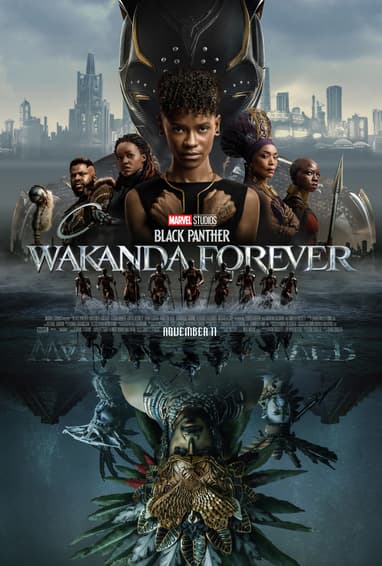
An unnerving siren call. A broken kingdom. An underwater paradise and a force that could end it all.
On Friday Nov. 11, fans of the Marvel Cinematic Universe were once again able to return to the dazzling, technologically advanced country of Wakanda in the franchise’s long-awaited sequel, “Wakanda Forever.” Coping with the death of the Black Panther, the film tells the poignant tale of a family struggling with grief as their nation is thrust into the world’s spotlight. Unforeseen conflict arises when a powerful leader of a secret kingdom threatens Wakanda’s safety and stability.
“Wakanda Forever” strays from Marvel’s typical action flick format containing surface-level morals and frequent humor, instead taking on a more serious tone. After the tragic passing of lead actor Chadwick Boseman, and with him his iconic character, T’Challa, “Wakanda Forever” focuses on the development of side characters. Women in positions of power in Wakandan society are at the center of the movie. Their roles display a refreshing theme of Black female empowerment , highlighting women’s contributions to Wakandan technology, weaponry, science and leadership.
These characters and their actors also further the movie’s tangible portrayal of grief and healing from the loss of a loved one. Shuri, played by Letitia Wright, performs a ritual meant to honor the late T’Challa, capturing her hopelessness, frustration and difficulty moving on from his death. The entire movie is a nuanced analysis of grief and its unexpected manifestations. The movie also had subtle nods honoring Boseman, such as the mention of T’Challa suffering through his illness without the public knowing what he was going through, just as Boseman had.
Apart from the complex emotional significance of “Wakanda Forever,” the movie also carried on the franchise’s prominent theme of Black power and strength. In a passionate speech in front of delegates of the United Nations, Queen Ramonda points out the discrimination against Wakanda and that it has been disrespected and attacked for its resources despite being a nation of peace, an ideal the rest of the world doesn’t meet.
“The movie also carried on the franchise’s prominent theme of Black power and strength”
The movie also broadens the Marvel Cinematic Universe’s cultural representation with the newly introduced underwater kingdom Talokan. Famously, “Black Panther” is made up of nearly all Black actors, but “Wakanda Forever’’ introduces people of Mayan and indigenous Mesoamerican heritage. Namor, the leader of the underwater Talokanil people, is played by a Mexican actor, as is his female counterpart. His backstory portrays the struggle his once-land-dwelling mother went through as her village suffered at the hands of Spanish colonizers.
“Wakanda Forever[’s]” incorporation of the largely untold history of Indigenous colonization helps to create an understanding of other cultures and people. Bringing minority groups’ accomplishments and history into light, the movie successfully celebrates diversity.
While “Wakanda Forever” is one prominent example of an increase in representation, Hollywood is integrating diversity into other large-scale projects. In June, Disney released its casting of Halle Bailey, a Black actress, to play Ariel in the live-action adaptation of “The Little Mermaid.” Black people have celebrated her casting, with parents taking to social media to share videos of their children’s reactions to the teaser trailer. Similarly, Marvel supervillain Kang the Conqueror will be played by Black actor Jonathan Majors. The character doesn’t belong to any human race in the comics, as he is depicted with blue skin. As popular film studios continue to diversify their media, they open up more opportunities for nonwhite actors and create roles which a wider audience can identify with.
In conclusion, “Wakanda Forever” is an impactful and captivating sequel that portrays Black power as righteous while still incorporating Marvel’s signature entertainment value. It is also an important contribution to an emerging diversification of Hollywood. The movie earns 4.5 stars for its enchanting character development and powerful themes, making it well worth its lengthy run time.





